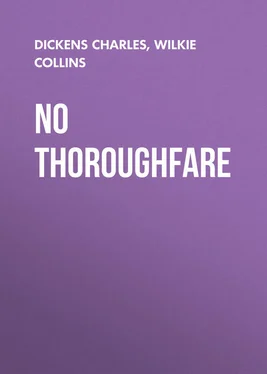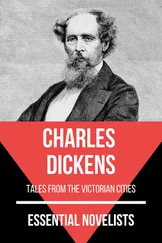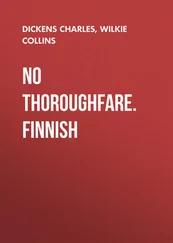Charles Dickens - No Thoroughfare
Здесь есть возможность читать онлайн «Charles Dickens - No Thoroughfare» — ознакомительный отрывок электронной книги совершенно бесплатно, а после прочтения отрывка купить полную версию. В некоторых случаях можно слушать аудио, скачать через торрент в формате fb2 и присутствует краткое содержание. Жанр: foreign_antique, foreign_prose, на английском языке. Описание произведения, (предисловие) а так же отзывы посетителей доступны на портале библиотеки ЛибКат.
- Название:No Thoroughfare
- Автор:
- Жанр:
- Год:неизвестен
- ISBN:нет данных
- Рейтинг книги:5 / 5. Голосов: 1
-
Избранное:Добавить в избранное
- Отзывы:
-
Ваша оценка:
- 100
- 1
- 2
- 3
- 4
- 5
No Thoroughfare: краткое содержание, описание и аннотация
Предлагаем к чтению аннотацию, описание, краткое содержание или предисловие (зависит от того, что написал сам автор книги «No Thoroughfare»). Если вы не нашли необходимую информацию о книге — напишите в комментариях, мы постараемся отыскать её.
No Thoroughfare — читать онлайн ознакомительный отрывок
Ниже представлен текст книги, разбитый по страницам. Система сохранения места последней прочитанной страницы, позволяет с удобством читать онлайн бесплатно книгу «No Thoroughfare», без необходимости каждый раз заново искать на чём Вы остановились. Поставьте закладку, и сможете в любой момент перейти на страницу, на которой закончили чтение.
Интервал:
Закладка:
“Under the name you now bear?”
“Under the name of Walter Wilding.”
“And the lady – ?” Mrs. Goldstraw stopped short with a look at the portrait which was now unmistakably a look of alarm.
“You mean my mother,” interrupted Mr. Wilding.
“Your – mother,” repeated the housekeeper, a little constrainedly, “removed you from the Foundling? At what age, sir?”
“At between eleven and twelve years old. It’s quite a romantic adventure, Mrs. Goldstraw.”
He told the story of the lady having spoken to him, while he sat at dinner with the other boys in the Foundling, and of all that had followed in his innocently communicative way. “My poor mother could never have discovered me,” he added, “if she had not met with one of the matrons who pitied her. The matron consented to touch the boy whose name was ‘Walter Wilding’ as she went round the dinner-tables – and so my mother discovered me again, after having parted from me as an infant at the Foundling doors.”
At those words Mrs. Goldstraw’s hand, resting on the table, dropped helplessly into her lap. She sat, looking at her new master, with a face that had turned deadly pale, and with eyes that expressed an unutterable dismay.
“What does this mean?” asked the wine-merchant. “Stop!” he cried. “Is there something else in the past time which I ought to associate with you? I remember my mother telling me of another person at the Foundling, to whose kindness she owed a debt of gratitude. When she first parted with me, as an infant, one of the nurses informed her of the name that had been given to me in the institution. You were that nurse?”
“God forgive me, sir – I was that nurse!”
“God forgive you?”
“We had better get back, sir (if I may make so bold as to say so), to my duties in the house,” said Mrs. Goldstraw. “Your breakfast-hour is eight. Do you lunch, or dine, in the middle of the day?”
The excessive pinkness which Mr. Bintrey had noticed in his client’s face began to appear there once more. Mr. Wilding put his hand to his head, and mastered some momentary confusion in that quarter, before he spoke again.
“Mrs. Goldstraw,” he said, “you are concealing something from me!”
The housekeeper obstinately repeated, “Please to favour me, sir, by saying whether you lunch, or dine, in the middle of the day?”
“I don’t know what I do in the middle of the day. I can’t enter into my household affairs, Mrs. Goldstraw, till I know why you regret an act of kindness to my mother, which she always spoke of gratefully to the end of her life. You are not doing me a service by your silence. You are agitating me, you are alarming me, you are bringing on the singing in my head.”
His hand went up to his head again, and the pink in his face deepened by a shade or two.
“It’s hard, sir, on just entering your service,” said the housekeeper, “to say what may cost me the loss of your good will. Please to remember, end how it may, that I only speak because you have insisted on my speaking, and because I see that I am alarming you by my silence. When I told the poor lady, whose portrait you have got there, the name by which her infant was christened in the Foundling, I allowed myself to forget my duty, and dreadful consequences, I am afraid, have followed from it. I’ll tell you the truth, as plainly as I can. A few months from the time when I had informed the lady of her baby’s name, there came to our institution in the country another lady (a stranger), whose object was to adopt one of our children. She brought the needful permission with her, and after looking at a great many of the children, without being able to make up her mind, she took a sudden fancy to one of the babies – a boy – under my care. Try, pray try, to compose yourself, sir! It’s no use disguising it any longer. The child the stranger took away was the child of that lady whose portrait hangs there!”
Mr. Wilding started to his feet. “Impossible!” he cried out, vehemently. “What are you talking about? What absurd story are you telling me now? There’s her portrait! Haven’t I told you so already? The portrait of my mother!”
“When that unhappy lady removed you from the Foundling, in after years,” said Mrs. Goldstraw, gently, “she was the victim, and you were the victim, sir, of a dreadful mistake.”
He dropped back into his chair. “The room goes round with me,” he said. “My head! my head!” The housekeeper rose in alarm, and opened the windows. Before she could get to the door to call for help, a sudden burst of tears relieved the oppression which had at first almost appeared to threaten his life. He signed entreatingly to Mrs. Goldstraw not to leave him. She waited until the paroxysm of weeping had worn itself out. He raised his head as he recovered himself, and looked at her with the angry unreasoning suspicion of a weak man.
“Mistake?” he said, wildly repeating her last word. “How do I know you are not mistaken yourself?”
“There is no hope that I am mistaken, sir. I will tell you why, when you are better fit to hear it.”
“Now! now!”
The tone in which he spoke warned Mrs. Goldstraw that it would be cruel kindness to let him comfort himself a moment longer with the vain hope that she might be wrong. A few words more would end it, and those few words she determined to speak.
“I have told you,” she said, “that the child of the lady whose portrait hangs there, was adopted in its infancy, and taken away by a stranger. I am as certain of what I say as that I am now sitting here, obliged to distress you, sir, sorely against my will. Please to carry your mind on, now, to about three months after that time. I was then at the Foundling, in London, waiting to take some children to our institution in the country. There was a question that day about naming an infant – a boy – who had just been received. We generally named them out of the Directory. On this occasion, one of the gentlemen who managed the Hospital happened to be looking over the Register. He noticed that the name of the baby who had been adopted (‘Walter Wilding’) was scratched out – for the reason, of course, that the child had been removed for good from our care. ‘Here’s a name to let,’ he said. ‘Give it to the new foundling who has been received to-day.’ The name was given, and the child was christened. You, sir, were that child.”
The wine-merchant’s head dropped on his breast. “I was that child!” he said to himself, trying helplessly to fix the idea in his mind. “I was that child!”
“Not very long after you had been received into the Institution, sir,” pursued Mrs. Goldstraw, “I left my situation there, to be married. If you will remember that, and if you can give your mind to it, you will see for yourself how the mistake happened. Between eleven and twelve years passed before the lady, whom you have believed to be your mother, returned to the Foundling, to find her son, and to remove him to her own home. The lady only knew that her infant had been called ‘Walter Wilding.’ The matron who took pity on her, could but point out the only ‘Walter Wilding’ known in the Institution. I, who might have set the matter right, was far away from the Foundling and all that belonged to it. There was nothing – there was really nothing that could prevent this terrible mistake from taking place. I feel for you – I do indeed, sir! You must think – and with reason – that it was in an evil hour that I came here (innocently enough, I’m sure), to apply for your housekeeper’s place. I feel as if I was to blame – I feel as if I ought to have had more self-command. If I had only been able to keep my face from showing you what that portrait and what your own words put into my mind, you need never, to your dying day, have known what you know now.”
Читать дальшеИнтервал:
Закладка:
Похожие книги на «No Thoroughfare»
Представляем Вашему вниманию похожие книги на «No Thoroughfare» списком для выбора. Мы отобрали схожую по названию и смыслу литературу в надежде предоставить читателям больше вариантов отыскать новые, интересные, ещё непрочитанные произведения.
Обсуждение, отзывы о книге «No Thoroughfare» и просто собственные мнения читателей. Оставьте ваши комментарии, напишите, что Вы думаете о произведении, его смысле или главных героях. Укажите что конкретно понравилось, а что нет, и почему Вы так считаете.












